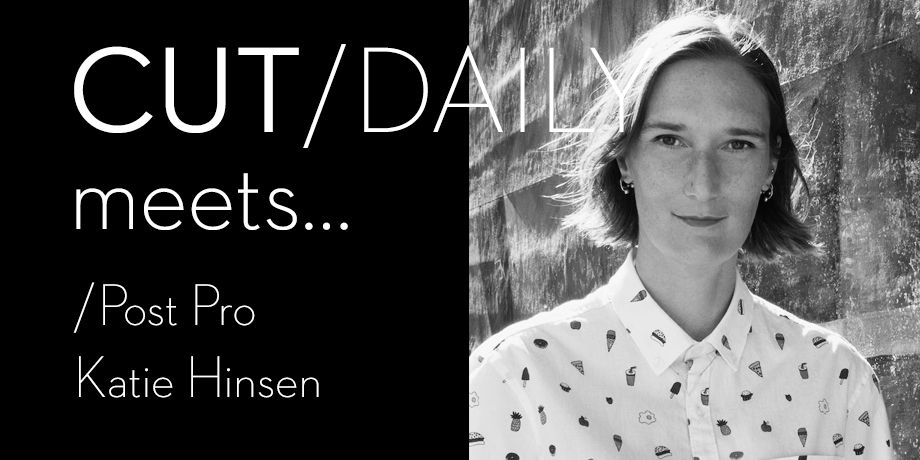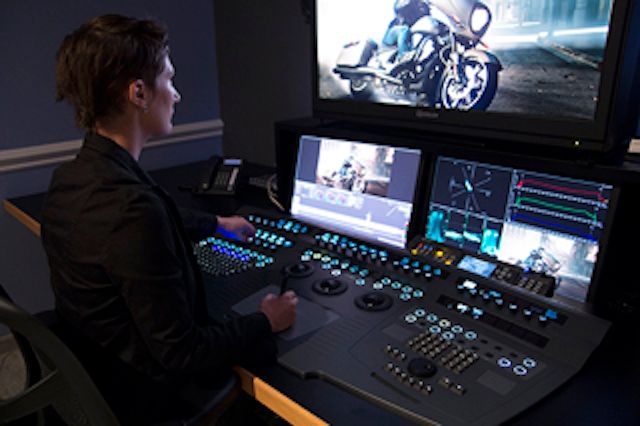#212 - Cut/daily Meets... Post Veteran Katie Hinsen

Katie Hinsen is the Director of Production Technology at Marvel Studios.
Before that, she was a Senior Finishing Artist at Light Iron, Goldcrest Post and a Senior Digital Intermediate Editor at Park Road Post in New Zealand.
She was also an Executive Producer at post house, Nice Shoes.
She is the founder and acting president of Blue Collar Post Collective and on EndCrawl's board of advisors.
Does this all tell you that she knows what's she's talking about?
In this issue of Cut/daily Meets... you're in for a wisdom soaked treat, especially when it comes to learning how to turn a (potentially) catastrophic failure into a career shaping success.
What’s your daily work routine?
It varies a lot!
My job is supporting the teams who support our shows. Most of my work is based around a schedule of meetings between 8:30am and 5:30pm.
If I don't need to work with a show or team starting production at 6am, I like to clear out little things early in the morning as soon as I wake up, then I'll work out and meditate before my official day begins.
As soon as my last meeting of the day is done, I'll take a couple of hours to cook, eat and unplug before checking in again in the evening.
Because I work with folks in production and post, all over the world, I may be working with teams starting very early or finishing very late, so I take as much time as I can when I'm not needed, to just decompress and rest.
What do you now know about your work that you wish you’d known when you first started?
That it takes time, patience and gentle persistence to make the biggest impacts.
Fast change can be painful and often doesn't leave room for reflection, iteration, and smart realignment of goals as the situation evolves.
I naturally tend to move fast and be really bold when there's an opportunity for impactful change. That approach has its place, but I have learned to play the long-game and remember that this industry consists of people and not every person thinks and works their best the way that I do.
The benefit in slowing things down is that ability to keep checking in and rather than going full-speed in one direction, having the ability to observe and listen, make turns and pivots, as we see things coming together.

What did your biggest professional failure teach you?
My biggest failure? Ah, there are so many!
This question is one I ask every time I get one of my teams together for a social event. I love to hear everyone sharing their biggest professional failures.
I'll pick one for you.
Back when I was a Finishing/DI Editor, we had just finished conforming a very difficult and complex documentary, and it was in color, when we started running out of storage. So I started deleting old stuff, and accidentally deleted the whole project.
It was unrecoverable.
But the thing is that this one time, after my initial panic, I had a moment of clarity and handled it the best I ever had.
I looked at what needed to be done to get back to where we were.
What we had, what we needed.
I called the whole conform team in and asked them if they could help me, working 24/7 in shifts, to rebuild the project.
I then called the Producer and told her what had happened, what we were doing to fix it, and that I needed her to ask the client to give us two full days pause to the grade so we could get there.
And we did!
That taught me how to approach huge catastrophic failures.
Stop, assess, determine a solution, communicate, act, then review.
Now, I advise folks when they need to communicate to their boss or client that they've made a mistake, to approach the conversation with: “This happened, we're doing this thing to solve it, and we will do this thing to avoid it in future.”
An epic fail turned into an epic win and it set me up to handle even bigger challenges with higher stakes as my career progressed.

What’s the #1 thing that has helped you shorten your craft’s learning curve?
Learning from other industries how they approach similar problems to what we have.
Shipping and Logistics, for example, are getting things safely and efficiently from one place to another. We do that with data and media.
Healthcare has to process and move data and media too, but in a highly secure environment. So do studios.
Startups handle huge organizational growth and change with limited resources. Sound familiar?
I've learned more, faster, from going outside our industry than from looking at our own past and present.
Getting outside of the echo chamber is a game-changer when it comes to learning, because it gives us more resources, broader perspectives, and a glimpse at our possible futures.

What book has helped you the most over your career?
A lot of books have influenced me in a lot of ways.
There is one line from Being Digital that is often quoted in other books and has influenced me throughout my career.
Nicholas Negroponte wrote in 1995:
The future of television is to stop thinking of television as television.
— Nicholas Negroponte
And your parting piece of advice?
Never underestimate how willing people in this industry are to offer their time and wisdom.
Just make sure you approach them with respect, humility, and having done your homework.
Most professionals are excited about their craft, and love the opportunity to share.
Thanks Katie!
Take This Further
- #203 - Post In Black - Insights from Katie's industry wide survey
- #207 - Valuable Lessons from 100 Tips to Build a Career in Post
So remember, ask for help and cut daily.
Please answer the Cut/daily reader survey. Thanks!
